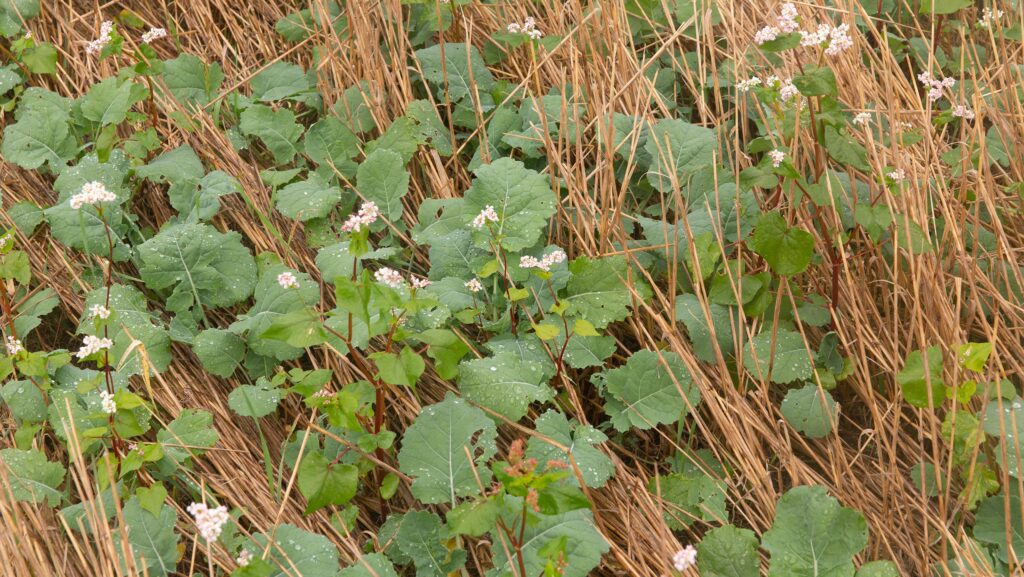Flea beetle and herbicide benefits of OSR and companion crops
 Oilseed rape planted alongside a companion crop of buckwheat and berseem clover © Tim Scrivener
Oilseed rape planted alongside a companion crop of buckwheat and berseem clover © Tim Scrivener Trials investigating the role of oilseed rape companion crops to deter cabbage stem flea beetle and minimise herbicide losses have revealed benefits of using berseem clover and buckwheat.
The trials were carried out by water company Affinity Water in partnership with the Woodhall Estate, in Hertfordshire, and Dewar Crop Protection over multiple growing seasons.
Where OSR plants were paired with berseem clover or buckwheat, results showed significantly fewer shot holes per plant than OSR grown alone.
“In the 2023 harvest data, yields were 5% and 7% higher where buckwheat or berseem clover were grown compared to OSR-only plots,” explains Affinity Water’s catchment manger, Danny Coffey.
See also: Online Yield Enhancement Network for linseed launched
The trial
In the 2023-24 growing season, the oilseed was drilled on the 12 August using a Horsch Sprinter drill in four fields covering 43ha.
Two days later, the following companions were established:
- Buckwheat
- Berseem clover
- Fenugreek
- Berseem clover and buckwheat
- Buckwheat, berseem clover and fenugreek
These were drilled into 30 randomised and replicated tramline plots, leaving the OSR-only tramlines as a control.
The cabbage stem flea beetle (CSFB) assessments were undertaken across all of the tramline plots.
The first assessments were carried out on 5 September 2023 – 23 days after sowing – to assess shot holing and the percentage of OSR plants damaged.
Where OSR was grown with berseem clover, the reduced number of shot holes per plant was found to be statistically significant.
This builds on evidence which indicates that the companion crops may potentially disguise the oilseed from CSFB damage during early establishment.
“The companion crop mixes appeared to provide a substantial reduction in CSFB damage during the December and February/March counts,” says Danny.
Significantly fewer CSFB larvae were recorded within the rapeseed that had buckwheat as a companion.
Buckwheat continued to show potential providing the greatest level of reduction in flea beetle damage into March.
It should be noted that this damage reduction is encouraging.
However, due to lower larval numbers being recorded across the area this season, these results were not deemed statistically significant, but may be significant in future trials.
Water quality
Trials assessing the potential benefits of companion cropping OSR for water quality protection by reducing the herbicide propyzamide also reveal berseem clover as a beneficial companion.
The extra vegetative cover offered by the clover appears to help reduce herbicide losses.
This is why Affinity Water continues to promote berseem clover as a companion crop as part of its water catchment schemes.
Trials investigating improved water quality benefits have been ongoing over the past two years.
To assess the water quality, porous pot suction samplers were installed into selected tramlines and soil water samples were collected and analysed.
However, little difference in propyzamide concentrations were detected across the plots this season.
This could be due to rapid flushing or dilution caused by heavy rainfall.
